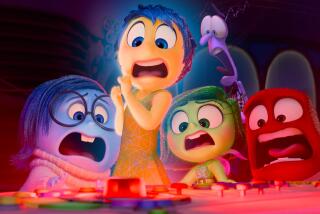‘Monsters University’: Is Pixar’s quality-success link over?
- Share via
John Lasseter’s colorful wardrobe aside, there are two eye-popping things about the golden age of Pixar, an era that started with the release of “Toy Story” in 1995 and, depending on how you view it, either ended in 2011 or is still going.
The first is its remarkable commercial record. Every one of its 13 movies coming into this weekend has been a hit of a certain order, the movies’ inflation-adjusted domestic takes no lower than $190 million and as high as $445 million.
The second is more subtle, but no less interesting: the company has seen an unusually strong link between the quality of a movie and how well it has performed in the marketplace.
PHOTOS: Celebrities by The Times
For most studios, well-reviewed movies routinely sputter, and critical stinkers frequently flourish. But Pixar has shown a surprisingly consistent correlation between quality and profitability.
Coming into this weekend, four of its top five domestic grossers — ”Finding Nemo” and the three “Toy Story” movies — are also its four best-reviewed movies of all time. (The two highest-grossing — “Nemo” and “Toy Story” — each earned a remarkable 99% on Rotten Tomatoes.)
In contrast, its weakest film at the box office, “Cars 2,” is also its worst-reviewed film (39% on Rotten Tomatoes). Its second-weakest film at the box office, “Brave,” is also its third worst-reviewed film, at 78%. The pattern holds, with only tiny deviations, throughout the list.
It’s a simple, impressive feat. In a time when marketing is king, the fortunes of Pixar, now owned by Disney, have risen or fallen based on the essential quality of its films. That’s not because Pixar doesn’t have a stellar marketing department--it does--but because that department has been able to drum up business based on the films themselves. When Pixar movies are good, we come out to see them in great numbers. When they’re not as good, we come out to see them in proportionally lower numbers.
And then came “Monsters University.” Though not a critical bomb, it’s a critical disappointment by Pixar standards. In fact, its 77% Rotten Tomatoes score puts it in a dismal No. 12 slot out of the 14 movies Pixar has released.
Yet, it hasn’t done No. 12 kind of business. It hasn’t done No. 8 kind of business. When it opened this weekend, “Monsters University” did No. 2 kind of business among all of its predecessors. Yes, its $82 million in the U.S. is the second-biggest opening ever for a Pixar movie.
Needless to say, there’s never been a disconnect like this between reviewers and box office for a Pixar film.
On one level, that spread is a testament to what Pixar has been able to do with this movie on the marketing end. Even though “Monsters University” isn’t as strong, the company was able to use clever promotional devices to bring us in. And why not? There’s nothing wrong with a studio ginning up a broad crowd-pleaser the critics don’t especially like.
Yet on another level this split is rather dispiriting. Over its 18-year history, Pixar has not only released some unusually strong movies, but it’s been able attract us based on quality. Other studios slip a few past us, spinning critical dross into box-office silver. Pixar doesn’t.
The animation outfit has always been the movie industry’s great anomaly: a company with an uncanny ability to produce quality films that also rake in billions in a competitive summer and holiday moviegoing season. After this weekend, it’s still the company that can do the latter. But that doesn’t necessarily have much to do with the former.
ALSO:‘Monsters University’ gives it that old college scare
Box office: ‘Monsters University’ to spook ‘World War Z’
‘Monsters University’ scares off ‘World War Z’ at the box office
Follow me on Twitter at ZeitchikLAT
More to Read
Only good movies
Get the Indie Focus newsletter, Mark Olsen's weekly guide to the world of cinema.
You may occasionally receive promotional content from the Los Angeles Times.










